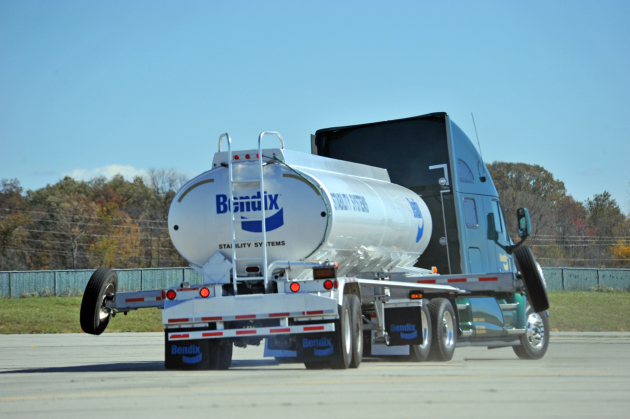Bendix gives update on safety system developments
LOUISVILLE, Ky. – The adoption rate for electronic stability control (ESC) on new trucks has flatlined over the past few years, and rollovers and jackknifes continue to be an issue in the industry.
That was the message from Fred Andersky, director of customer solutions – controls, for Bendix, who addressed the truck press at the Mid-America Trucking Show. He said about 32-35% of new Class 8 trucks are being spec’d with ESC and that the percentage hasn’t changed much over the past three years.

“As much as we would like to sit back and say rollovers and jackknifes have been reduced, in terms of vehicle miles traveled, we’re still at the same rate we were in 2008,” Andersky said. “Last year, we had over 9,000 rollovers and 4,000 jackknifes on the road with large trucks.”
FMVSS 136 will change that. It will require all new trucks to come equipped with stability control beginning this August with 6×4 tractors. Andersky he said he expects to see more truck manufacturers making stability control standard as the mandate nears.
Interest in another safety technology, air disc brakes, continues to grow, according to Keith McComsey, director, marketing and customer solutions, wheel-ends, at Bendix Spicer Foundation Brake. The take rate for air disc brakes on trucks was 16% in 2016 and 6% on trailers. Bendix is projecting that to increase to 27% on trucks and 20% on trailers by 2020.
McComsey said this growth will occur as OEMs change how they position air disc brakes in the market. For instance, Paccar has made air disc brakes standard on steer axle positions. McComsey said fleets are also recognizing the benefits of disc brakes in terms of performance and total cost of ownership.
He said brake job service intervals are 1.5 times longer when running disc brakes and the labor required to service disc brakes is reduced by 25%, since it’s quicker to replace a pad than a shoe. Some fleets are able to avoid friction changes through the first life of the vehicle when running disc brakes, McComsey added.
But fleets that choose to run disc brakes must take care to use approved aftermarket materials. One of the advantages of choosing disc brakes on the truck and trailer is that stopping distance is reduced by 50 feet at 70 mph and 20 feet at 60 mph compared to an all-drum tractor-trailer configuration. Genuine aftermarket parts are required to maintain that shorter stopping distance.
“Fifty feet is the difference between a crash and a close call and if you have an accident and you used the wrong stuff on your vehicles and it’s not meeting the spec’, you’re in trouble,” said Andersky. “It’s a liability.”
Genuine aftermarket pads maintain a 200-ft. stopping distance, while other aftermarket products can add 30-50 feet, McComsey said. He also noted collision mitigation systems are affected by braking performance.
Andersky also noted Bendix’s Wingman Advanced forward collision mitigation system is now on 100,000 trucks.
“Fleets are recognizing the value of it,” he said, noting one fleet saw a 70% reduction in rear-end crashes and a 70% reduction in the severity of those crashes that still took place. Andersky noted a truck rear-ends a passenger vehicle 40,000 times a year in the US. Wingman Fusion combines radar and camera technologies to provide further capabilities, including stationary object braking.
A second generation of Wingman Fusion is in development. At the Mid-America Trucking Show, both Kenworth and Peterbilt announced Wingman Advanced is now standard on their new highway trucks. Bendix is also developing retrofit kits so that customers using Wingman Advanced can upgrade to Wingman Fusion.
Have your say
This is a moderated forum. Comments will no longer be published unless they are accompanied by a first and last name and a verifiable email address. (Today's Trucking will not publish or share the email address.) Profane language and content deemed to be libelous, racist, or threatening in nature will not be published under any circumstances.